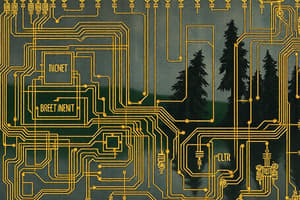Podcast
Questions and Answers
What is the function of a diode in an electrical circuit?
What is the function of a diode in an electrical circuit?
- To allow current to flow in one direction (correct)
- To measure potential difference
- To store electrical energy
- To convert electrical energy into light
Which symbol represents a closed switch in a circuit?
Which symbol represents a closed switch in a circuit?
- 💡
- 🠆
- ◯──◯ (correct)
- ◯─
What is the measurement unit for resistance?
What is the measurement unit for resistance?
- Volts (V)
- Coulombs (C)
- Ohms (Ω) (correct)
- Amperes (A)
In a series circuit, how does the total resistance change when more resistors are added?
In a series circuit, how does the total resistance change when more resistors are added?
According to the equation Energy Transferred (E) = Potential Difference (V) × Charge (Q), what happens to the energy transferred if potential difference is doubled?
According to the equation Energy Transferred (E) = Potential Difference (V) × Charge (Q), what happens to the energy transferred if potential difference is doubled?
Flashcards
Resistance
Resistance
The opposition to the flow of electric current. Think of it like friction for electrons.
Voltmeter
Voltmeter
A device used to measure the potential difference between two points, like a battery.
Current
Current
The rate at which electric charge flows through a circuit. Like a river, the faster the flow, the more current.
Series Circuit
Series Circuit
Signup and view all the flashcards
Parallel Circuit
Parallel Circuit
Signup and view all the flashcards
Study Notes
Circuit Symbols
- Switches (open and closed)
- Lamp
- Cell
- Battery
- Diode
- Resistor
- Variable resistor
- LED
- Fuse
- Voltmeter
- Ammeter
- Thermistor
- LDR
Electrical Circuits
- Series circuits have one single loop.
- Parallel circuits have more than one loop.
- Ammeter measures current (in amps).
- Voltmeter measures potential difference (in volts).
Key Equations
- Potential Difference (V) = Current (I) x Resistance (R)
- Charge (Q) = Current (I) x time (t)
- Energy Transferred (E) = Potential Difference (V) x Charge (Q)
Electricity Terminology
- Current: The rate of flow of charge, measured in amps (A).
- Potential Difference: The amount of energy transferred to each electron, measured in volts (V).
- Resistance: The opposition to current flow in a circuit, measured in ohms (Ω).
Studying That Suits You
Use AI to generate personalized quizzes and flashcards to suit your learning preferences.




